No products in the cart.
Many hurdles of India’s most public education-friendly party: Aam Aadmi Party
Against the depressing backdrop of indifference to education and human resource development of all political parties across the ideological spectrum, the Aam Aadmi Party, which currently rules Delhi state with a massive majority in the legislative assembly, is an exception – Autar Nehru
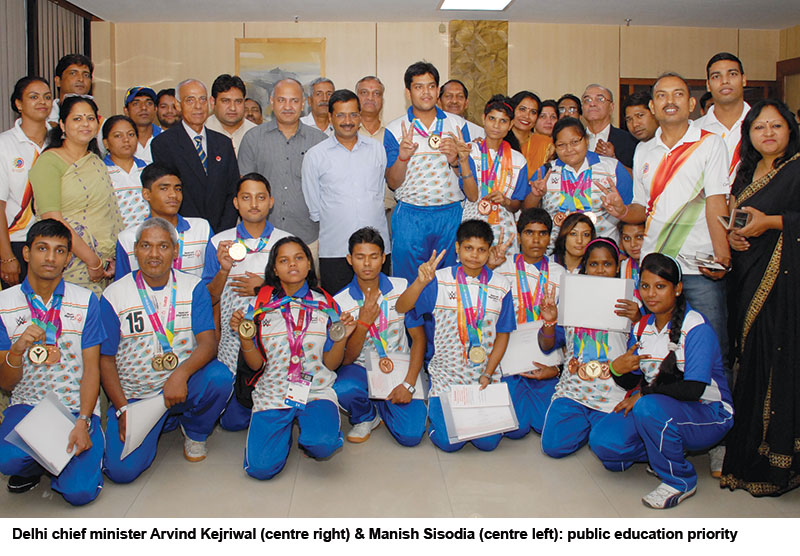
This feature is being written in mid-May. Within a week hereof, the Election Commission of India will declare the results of General Election 2019. According to a majority of political pundits and soothsayers, the outcome of this general election could prove the most decisive in the history of post-independence India.
The face-off in General Election 2019 in which 900 million eligible voters of the world’s most populous democracy will elect 542 members of the Lok Sabha — the all-important lower Parliament — is between the incumbent Bharatiya Janata Party (BJP) and the Congress party which under the leadership of Mahatma Gandhi (1869-1948) led India to independence from almost two centuries of British rule and has ruled at the Centre for 54 years (although not continuously) since India’s independence.
The Congress is a constituent of the mahagathbandhan (grand coalition) of political parties subscribing to ideologies across the spectrum from fascism to communism and Maoism. The opposition is united in the belief that if the BJP/NDA is re-elected, and particularly if BJP wins a majority in the Lok Sabha in its own right, the new government will tamper with the “basic structure of the Constitution” (prohibited by the Supreme Court in 1973) and sabotage the “idea of India” conceptualised as a secular, democratic nation in which all citizens regardless of caste, creed or community are equal before the law, and all citizens, especially religious and linguistic minorities, are protected and enabled by the “seven freedoms” enshrined in Article 19 of the Constitution.
Unfortunately, despite its critical importance for national development, public education isn’t anywhere near a major issue in General Election 2019. Although the manifestos of all political parties have something to say on the subject, there is a tired deja vu ring to the promises they make — and don’t intend to keep — about education.
The BJP’s sankalp patra (‘solemn vow’) manifesto is silent on the issues of 6 percent of GDP allocation for public education promised in its General Election 2014 manifesto, and on extending the ambit of the landmark Right of Children to Free & Compulsory Education (RTE) Act, 2009 (which makes it mandatory for the State to provide free and compulsory elementary (class I-VIII) education to all children in the 6-14 age group), to cover children in secondary (class VIII-X) school as well. Moreover, it’s well-known that the RSS/BJP top brass believe the road to India’s future development lies through the past. Therefore, the focus of the party’s lightweight intellectuals is re-discovery of the proud glories of ancient Hindu India before the Muslim invasions which began in the 13th century.
Nor during the past five years that it has been in office at the Centre and in several states, has the BJP done anything notable in education, except expand the autonomy of the showpiece IIMs and IITs. Conversely, it has packed several reputed higher education institutions such as the Indian Council for Historical Research and Jawaharlal Nehru University among others with under-qualified RSS ideologues, even as the annual budget allocation for education has flatlined. Quite clearly, the BJP top leadership doesn’t believe that modernisation of Indian education is an election winning issue.
If one takes into account the historical truth that the Congress has ruled independent India at the Centre and in several states for over half a century, the education development and modernisation record of the party is as bad, if not worse. Despite the high-powered Kothari Commission (1966) having strongly recommended that annual expenditure (Centre plus states) on public education be raised to 6 percent of GDP forthwith, this desideratum has never been attained, averaging a mere 3.5 percent.
The huge annual establishment maintenance, defence and leaky socio-economic development programmes of socialist Congress governments whose giant public sector enterprises (PSEs) failed to generate promised surpluses, left mere crumbs for investment in human resource development — education and health. The terrible consequence of the continuous neglect of public education — the middle class had the option of good quality private schools — is that contemporary India is saddled with the world’s largest and arguably most under-educated child and youth population estimated at over 500 million. Under-qualified for 21st century jobs and suffering severe unemployment and under-employment, this is a dangerously volatile and combustible segment of contemporary Indian society.
Against this depressing backdrop of indifference to education and human resource development of all political parties across the ideological spectrum, there is one which seems to be an exception to the rule — the Aam Aadmi Party (AAP) which currently rules Delhi state with a massive majority in the legislative assembly. Essentially AAP is a splinter group which broke away from social activist Anna Hazare’s anti-corruption crusade of 2012. After Hazare’s self-imposed fast of ten days ended voluntarily following an assurance of all major parties that a Lok Pal (people’s ombudsman) will be appointed, against Hazare’s advice, Arvind Kejriwal, former bureaucrat and an RTI activist, and several other senior leaders of the anti-corruption movement registered AAP as a political party and fought the Delhi state legislative election of 2013, emerging as the second largest party winning 28 of the 70 seats.
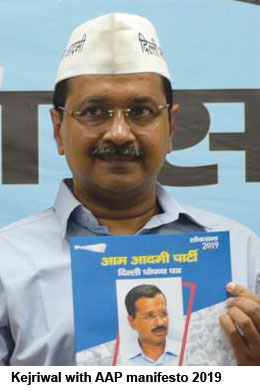 After the BJP/NDA alliance triumphed in General Election 2014 with the BJP (282 seats) winning a majority in the Lok Sabha, the Central government dissolved the Delhi state legislative assembly and called for fresh elections in 2015. Against all expectations, AAP humbled the high-riding BJP and swept the assembly election winning 67 of the 70 seats of the house. During its election campaign and subsequently, a major election plank of AAP was — and continues to be — reform of Delhi state’s education, especially the K-12 public school system.
After the BJP/NDA alliance triumphed in General Election 2014 with the BJP (282 seats) winning a majority in the Lok Sabha, the Central government dissolved the Delhi state legislative assembly and called for fresh elections in 2015. Against all expectations, AAP humbled the high-riding BJP and swept the assembly election winning 67 of the 70 seats of the house. During its election campaign and subsequently, a major election plank of AAP was — and continues to be — reform of Delhi state’s education, especially the K-12 public school system.
AAP’s General Election Manifesto 2019 accords high priority to school and higher education. After taking credit for adding 8,213 classrooms to the state government’s 1,028 public schools “despite all the hurdles laid by Central government” (with another 12,748 scheduled to be added by November); sending Delhi government school teachers to “coveted institutes in Finland, Singapore & United Kingdom” for training; launching special initiatives to improve the foundational learning skills of students; introducing happiness and entrepreneurship curriculums in government schools; re-energising parent-dominated School Management Committees mandated under s.21 (1) of the landmark RTE Act, and reiterating that Delhi’s government schools have performed better than the state’s private schools in class XII results consecutively for the past three years, the AAP General Election 2019 manifesto draws a rosy picture for citizens of the national capital after full statehood is attained following negotiations with the new government at the Centre.
The party’s 2019 manifesto inter alia promises every child in Delhi free, “world-class” nursery-class XII education, assured college admission to Delhi school students averaging over 60 percent in class XII, 85 percent reservation for Delhi’s students in college admissions, “expanded infrastructure and teaching strength”, new schools and colleges staffed by regular teachers, regularisation of guest teachers and promotion of new medical and engineering colleges 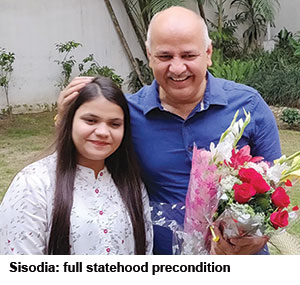 to increase annual intake by 10,000 students. However, the manifesto doesn’t spell out the expenditure involved to fulfil these promises.
to increase annual intake by 10,000 students. However, the manifesto doesn’t spell out the expenditure involved to fulfil these promises.
Nevertheless during the past four years, Delhi’s AAP government has emerged as the only administration countrywide that has given primary-secondary education reform high and arguably top priority. It has consistently increased the state government’s annual outlay for education from 23.8 percent of the total budget in 2015-16 to 26 percent (Rs.15,601 crore) in 2019-20. The educationally backward states of Uttar Pradesh, Bihar and Rajasthan allocate a mere 16.1 percent of their total state budget for education. Even the educationally advanced state of Karnataka allocated a mere 10.9 percent (Rs.23,760 crore) for education. Consequently, the AAP government’s education outlay per child is Rs.51,745 (cf. the national average of Rs.13,974).
Moreover, AAP’s widely publicised claim to have constructed 8,213 new, fully wired classrooms in its 1,028 state government schools with another 12,748 classrooms nearing completion, and press releases claiming that children from state government schools have out-performed their private school peers in the class XII CBSE board exams have attracted large media headlines in the national capital. Ditto its widely publicised initiative of sending over 800 government school teachers/leaders to top-ranked universities in the UK, US and Singapore.
Critics and spokespersons of opposition parties tend to dismiss the claims of the AAP government as media hype and window dressing. First, they point out that the state government’s impact on K-12 education in Delhi is limited, as the total number of state government schools in the national capital is a mere 1,028 with an aggregate enrolment of 1.4 million children. State government schools number less than a fifth of the 5,800 K-12 schools in Delhi with the 1,832 schools of the city’s four municipal corporations (New Delhi, and Delhi North, East and South) and the Delhi Cantonment Board outnumbering state government schools. Therefore with higher per capita outlay per student in state government schools, their better board exam results are inevitable and unsurprising. Moreover, they dismiss the overseas training of “a few dozen” government school teachers as junkets for politically influential teachers.
Yet if the AAP government of Delhi state has made an insignificant and overhyped impact on the national capital’s school education system as the party’s critics allege, it’s not for want of trying. Since it was swept to power in 2015 in the legislative assembly by the national capital’s electorate with a mind-boggling majority, unlike the intellectually challenged leaders of major political parties who believe education reform is not an election winning issue, the AAP leadership has taken a contrary position. Immediately after it was sworn-in, it legislated three Bills to amend the Delhi School Education Act, 1973, establish a Netaji Subhas Chandra Bose Technological University, and refund “excess” fees paid to private schools by parents.
However, under the complex constitutional arrangement governing the national capital, all Bills passed by the Delhi state legislative assembly need the approval of the Central government-appointed lieutenant governor of Delhi, i.e, of the Central government. This constitutional contradiction posed no problem as long as the Central and state governments were formed by the same political party. But the unprecedented sweep of AAP in the Delhi state assembly election of 2015 and the humiliating defeat of the high-riding BJP that year, has resulted in the BJP/NDA government routinely vetoing all major legislation proposed by the state government.
“Despite the people of Delhi having given AAP an overwhelming majority in the state legislative assembly — or perhaps because of it — the BJP-led NDA Central government, which has little interest in education, has repeatedly blocked our education reform and improvement initiatives. The reform and upgradation of Delhi’s government schools and prevention of profiteering by private schools is top priority for the AAP government. But several education bills passed by the assembly to recruit teachers for government schools, introduce transparency, accountability and reforms in the state’s private schools, to regulate private budget schools and acquire land to build more government schools have been blocked by the Central government. This is why we have made full statehood for Delhi the major plank in our 2019 election manifesto,” says Manish Sisodia, an alumnus of Bharatiya Vidya Bhavan, Delhi, former TV anchor and currently deputy chief and education minister of Delhi state’s AAP government.
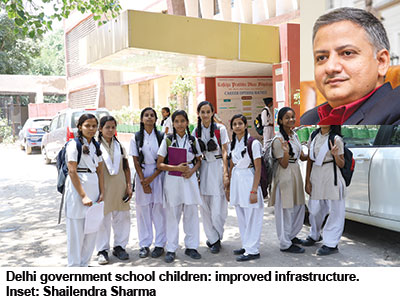 The AAP leadership’s exceptional belief that education reform is a votes-getting issue has impressed knowledgeable monitors of the national capital’s education scene. “The AAP administration has substantially enhanced the annual outlay for education in its budget, improved the infrastructure of state government schools, sent teachers abroad for training and re-energised government schools. But for constitutional and jurisdictional reasons, the impact of its public school education reforms has been limited.
The AAP leadership’s exceptional belief that education reform is a votes-getting issue has impressed knowledgeable monitors of the national capital’s education scene. “The AAP administration has substantially enhanced the annual outlay for education in its budget, improved the infrastructure of state government schools, sent teachers abroad for training and re-energised government schools. But for constitutional and jurisdictional reasons, the impact of its public school education reforms has been limited.
However, the good work that the AAP administration is doing to reform its government schools is being offset by its demonisation of private schools. Delhi has a large number of excellent private schools which provide globally benchmarked K-12 education at relatively affordable price points, as well as private budget schools for low-income households. These are being targeted by the AAP leadership which is insistent on imposing unrealistic tuition fee ceilings and demanding return of so-called excess fees. Such interference with the autonomy and micro-management of private schools has dangerous implications for Indian education,” says Dr. Parth Shah, former professor of economics at Michigan University and founder-president of the Delhi-based Centre for Civil Society (estb.1997), one of India’s top think tanks.
According to Shailendra Sharma, principal-advisor of the Delhi state government’s Directorate of Education, ab initio the AAP government drew four clear priorities for the reform and rejuvenation of the languishing 1,028 primary-secondary schools under its jurisdiction. The four priorities were to radically improve physical infrastructure and facilities, initiate an intensive and sustained in-service teacher training programme for the schools’ 58,000 teachers, improve school-community linkages through resuscitation and revival of school management committees (SMCs) mandated by s.21 (1) of the RTE Act, 2009 and introduce learning outcome interventions. In Delhi, the SMCs have been replaced by Vidyalaya Kalyan Samitis (school welfare committees) with each committee comprising 16 members, of whom 12 are parents.
“Crumbling, ill-maintained school buildings with ill-furnished, broken down classrooms signal administrative neglect and broken self-esteem. Therefore, the AAP government has accorded high priority to repairing school buildings, constructing 21 new school buildings and adding 8,000 classrooms equipped with the most modern learning aids and facilities. Moreover, we have empowered school principals to hire estate managers, security guards and outsource the work of maintaining toilets and hygiene standards to professional agencies. This has freed up principals’ time and enabled them to focus on teacher training and improving students’ learning outcomes,” says Sisodia.
This initiative to scale up and modernise infrastructure of government schools to bring it on a par with private schools is extraordinary, especially for state government-run schools. Although the country’s 1,125 Central government-funded and managed Kendriya Vidyalayas and 576 Jawahar Navodaya Vidyalayas (rural boarding schools for meritorious children) are very well-funded with per-child expenditure exceeding Rs.1 lakh annually, over 80 percent of the country’s 1.20 million government schools are defined by ramshackle buildings, furniture-less classrooms, unusable toilets, electricity shortages and rock-bottom learning outcomes (as testified by the Annual Status of Education Reports of the highly-reputed Pratham Education Foundation) with average per-child expenditure of Rs.3,000-5,000 per year. It’s against this backdrop that the AAP government’s public schools improvement and upgradation drive represents a shining and exemplary contrast.
“There is substantial improvement in my children’s learning levels. Earlier state government schools had broken windows, ugly walls and unusable toilets. But all that’s changed. My children happily boast about their school’s cleanliness, activities and facilities. I educated them till class V in private schools, but couldn’t afford to support them any longer and a government school was the only choice. But now I don’t regret this at all. My children are in a good school and learning,” says Mohammed Anees, a daily wage painter and father of three children including two daughters enrolled in the state government-run Sarvodaya Kanya Vidyalaya, Seemapuri.
The second big initiative of the AAP government of Delhi state worthy of emulation by all states is in teacher training and development. On average, the 58,000 teachers employed in Delhi’s 1,028 state government schools receive 5-15 days of in-service training and development per year. Moreover, the state government has devised a unique programme of selecting 200 innovative teachers as mentor teachers. All 200 mentor teachers attend a five-day 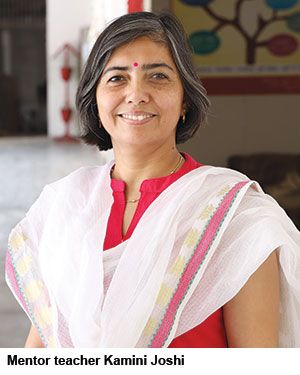 training programme at the National Institute of Education, Singapore to acquaint themselves with new pedagogies and enhance their teaching skills. Each mentor-teacher is assigned five-six state government schools which she visits fortnightly to interact with principals and teachers and lead teacher training workshops organised by the State Council of Educational Research & Training (SCERT). “Our job is not to conduct a formal inspection or assessment, but to initiate conversations with our assigned schools about their administrative challenges and problems confronting teachers, and to decide when to schedule training workshops for primary and secondary teachers,” says Kamini Joshi, a graduate of Delhi University and mentor teacher.
training programme at the National Institute of Education, Singapore to acquaint themselves with new pedagogies and enhance their teaching skills. Each mentor-teacher is assigned five-six state government schools which she visits fortnightly to interact with principals and teachers and lead teacher training workshops organised by the State Council of Educational Research & Training (SCERT). “Our job is not to conduct a formal inspection or assessment, but to initiate conversations with our assigned schools about their administrative challenges and problems confronting teachers, and to decide when to schedule training workshops for primary and secondary teachers,” says Kamini Joshi, a graduate of Delhi University and mentor teacher.
The AAP government’s programme for teacher training and development is supplemented by leadership development programmes for principals of state government schools to inculcate “a sense of ownership towards their school”. For this purpose, state government schools are grouped into “clusters” of ten and 100 cluster heads elected in rotation meet once per month to discuss issues relating to whole school development, teacher training and improvement of students learning outcomes. Moreover, over 650 government school principals have attended leadership development programmes at the Indian Institutes of Management in Ahmedabad and Lucknow, and 102 principals attended a 12-day institution and leadership development programme in Cambridge University, UK in 2018. In addition, 22 principals attended a seven-day workshop conducted by the education ministry of Finland — a country globally admired for its excellent public education system — in 2017.
The AAP government’s intensive and continuous teacher training and leadership development programmes, unprecedented and unimaginable for government — especially state and local government — schools, has hugely boosted the morale of teachers and principals of Delhi’s 1,028 state government primary-secondaries. “The cluster meetings and teacher training workshops have motivated teachers to appreciate new technology-enabled pedagogies and ways and means to improve students learning outcomes. This has made it easier for principals to build teams and introduce new pedagogies and learning programmes. Moreover, the deputation of principals to workshops and leadership development programmes designed by the IIMs and top-ranked universities around the world has opened up our minds to new education technologies and tremendously enhanced our confidence and exposure,” says Ajay Choubey, principal of the co-ed class VI-XII RPVV Government School (estb.2004) which has 750 children mentored by 42 teachers on its muster rolls.
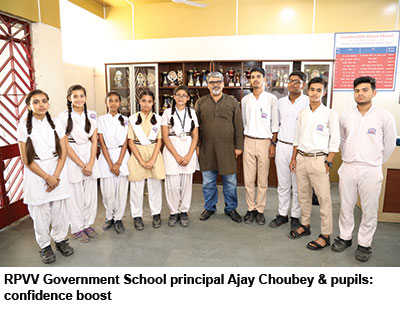 The third major initiative of the AAP state government has been to resuscitate and empower school management committees mandated by s.21 (1) of the RTE Act, 2009. Establishment of SMCs comprising “elected representatives of the local authority, teachers and parents” — with parents to constitute 75 percent of the membership — are obligatory for all government schools. Under the Act, the prime duties of SMCs are to monitor the working of their school, prepare a school development plan and monitor utilisation of government grants.
The third major initiative of the AAP state government has been to resuscitate and empower school management committees mandated by s.21 (1) of the RTE Act, 2009. Establishment of SMCs comprising “elected representatives of the local authority, teachers and parents” — with parents to constitute 75 percent of the membership — are obligatory for all government schools. Under the Act, the prime duties of SMCs are to monitor the working of their school, prepare a school development plan and monitor utilisation of government grants.
Delhi’s AAP government has made it compulsory for all its schools to establish SMCs in the interests of promoting school-community linkages even providing Rs.5-7 lakh per year per school to meet incidental expenses. “Establishment of SMCs has had the positive effect of involving the parents’ community with our schools. SMCs assist schools in organising parent-teacher meetings where parents are encouraged to discuss their children’s progress and prepare and monitor implementation of the school development plan. Community-school linkages have been strengthened by raising trust levels between parents and teachers and made parents partners in their children’s learning journey,” says Shailendra Sharma.
The fourth pillar of the public school improvement programme of the AAP government of Delhi state has proved more controversial. Under pressure to improve board exam results, the state government — despite the professed socialist ideology of its leadership — has introduced the Pratibha and Nishtha divisions which is a peculiar feature of state government schools in Delhi. Under this system introduced in 2016 by the AAP government, children in classes I-VIII are divided into two groups — Pratibha (with reading and maths competence) and Nishtha (low learning levels). The former are prepared for CBSE board exams while the latter are encouraged to write the less testing school-leaving exam of NIOS (National Institute of Open Schooling). This division which is against the essence of the inclusive education spirit of the RTE Act, combined with other initiatives such as installation of CCTV surveillance cameras, have aroused the wrath of several well-informed monitors of Delhi’s K-12 education sector.
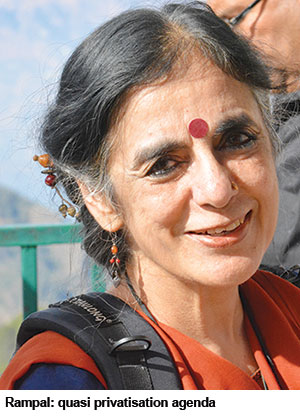 Dr. Anita Rampal, a physics alumna with a Ph D from Delhi University and former dean and professor at the faculty of education at DU, expresses “disillusionment” with the “regressive measures” taken by the AAP government in the cause of reforming the public education system.
Dr. Anita Rampal, a physics alumna with a Ph D from Delhi University and former dean and professor at the faculty of education at DU, expresses “disillusionment” with the “regressive measures” taken by the AAP government in the cause of reforming the public education system.
“Segregation of children into talented and weak categories in state government schools is against educational principles and the inclusive provisions and spirit of the RTE Act. Moreover, heavy surveillance through CCTV cameras and proposed live streaming to parents’ cell phones is indicative of lack of trust in teachers and against the privacy of children and is certain to inhibit innovation and creativity. The AAP government’s education policy prescription for government schools is aligned with the quasi-privatisation agenda of global corporates and NGOs such as Central Square and Pratham Education Foundation,” says Rampal.
Social activist and lawyer Ashok Agarwal, a self-confessed communist who has been waging a prolonged battle against the state government as well as private schools in the national capital, is also displeased with the professedly socialist AAP government’s public schools reform initiatives.
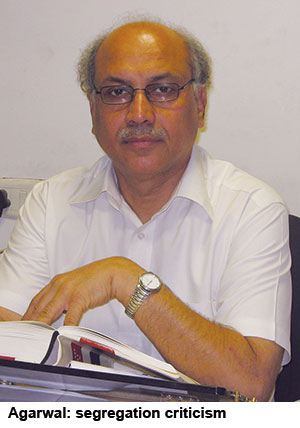 “Since 2015, AAP hasn’t recruited any regular teachers for state government schools. Instead, it has recruited 22,000 under-qualified guest teachers, most of whom failed the Delhi subordinate services selection board exam. The outcome of poor quality class I-VIII education dispensed during the past four years is that 500,000 children have failed their exams in classes IX-XII. The state government’s policy is to issue transfer certificates to children who fail twice in senior school and to advise them to write the NIOS exam. On the intervention of the Supreme Court, 100,000 of these exiled children have been taken back by state government schools, but the other 400,000 have simply disappeared, presumably into the unorganised sector’s labour force. Under AAP government’s rule teaching-learning standards in state government schools have fallen with only gifted children writing board exams to make the government look good,” says Agarwal, who is also highly critical of AAP for the “vote-catching” distinction made in its manifesto between Delhi citizens and outsiders. (See AAP General Election 2019 manifesto p.54).
“Since 2015, AAP hasn’t recruited any regular teachers for state government schools. Instead, it has recruited 22,000 under-qualified guest teachers, most of whom failed the Delhi subordinate services selection board exam. The outcome of poor quality class I-VIII education dispensed during the past four years is that 500,000 children have failed their exams in classes IX-XII. The state government’s policy is to issue transfer certificates to children who fail twice in senior school and to advise them to write the NIOS exam. On the intervention of the Supreme Court, 100,000 of these exiled children have been taken back by state government schools, but the other 400,000 have simply disappeared, presumably into the unorganised sector’s labour force. Under AAP government’s rule teaching-learning standards in state government schools have fallen with only gifted children writing board exams to make the government look good,” says Agarwal, who is also highly critical of AAP for the “vote-catching” distinction made in its manifesto between Delhi citizens and outsiders. (See AAP General Election 2019 manifesto p.54).
Yet even if the AAP government’s efforts in reforming Delhi’s public school system are less than perfect, there is no gainsaying that the party’s leadership deserves credit for identifying education reform as high priority socio-economic development, and perhaps election-winning issue. This distinguishes this young political party from others which pay mere lip service to this vitally important subject, cruelly neglected by the Central and state governments since independence. The consequences of the sustained neglect of public education have been disastrous. On almost every metric of national development — per capita income, farm, factory and office productivity, youth job-readiness and employment — 21st century India is ranked in the lowest decile globally.
Therefore, the AAP leadership and particularly Atishi Marlena, the Stephen’s College, Delhi and Oxford University 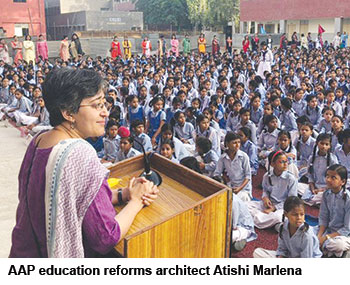 (UK)-educated former advisor to education minister Manish Sisodia, deserves credit for taking pains to redesign and rejuvenate Delhi’s state government schools. Busy with electioneering, Marlena who is fighting a campaign to represent East Delhi in the Lok Sabha was unavailable for comment.
(UK)-educated former advisor to education minister Manish Sisodia, deserves credit for taking pains to redesign and rejuvenate Delhi’s state government schools. Busy with electioneering, Marlena who is fighting a campaign to represent East Delhi in the Lok Sabha was unavailable for comment.
Unfortunately, the party’s unprecedented initiatives in improving state government schools through infrastructure upgradation, intensive infusion of technology in classrooms and improving students’ learning outcomes are being offset by the party leadership’s determination to interfere with the administration of the national capital’s estimated 3,000 private unaided schools, and particularly to control and regulate the tuition fees charged by private school managements.
In November, shortly after it swept the legislative assembly election of 2015, the AAP government passed the Delhi School (Verification of Accounts & Refund of Excess Fees) Bill, 2015, requiring private unaided schools to open up their books to inspectors of the state government. Under the provisions of this legislation, in May last year the AAP government directed 575 private unaided (independent) schools in Delhi to refund Rs.750 crore excess fees allegedly charged by these schools in the period June 2016 to January 2018, to parents of enrolled children.
Private school promoters trace “government assault and bullying” of private unaided schools for allegedly charging excess fees way back to an order issued by the Delhi high court in August 2012, when the court constituted a Justice Anil Dev Singh committee to stop ‘unjustified’ tuition fee increases. Thus far, the committee has submitted 12 interim reports after inspecting the books of 1,100 schools and identified 604 schools as having levied “unjustified” fees aggregating Rs.750 crore to be paid back to parents.
Unsurprisingly, private schools banded under the banner of the Action Committee of Unaided Private Schools of Delhi have challenged appointment of the committee, with none of them having reimbursed allegedly excess fees as per the order of the directorate of education. Their writ petition challenging the constitutional validity of the Justice Anil Dev Singh Committee and its reports is scheduled to be heard by a two-judge bench of the Delhi high court on July 12.
“The AAP government is endangering the future of 50 percent of Delhi’s children who are studying in private 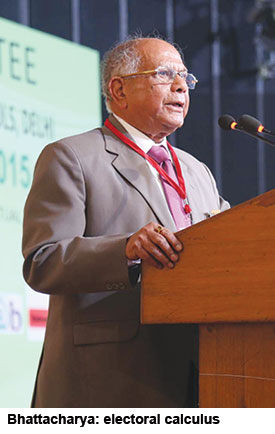 schools. Despite the Central government having withheld its assent to the verification of accounts and refund of excess fees Bill of the state government, the directorate of education is harassing private school managements, which have allowed government inspectors full access to their books of account in the interests of transparency, with a rain of orders and circulars. Simultaneously, the AAP government is instigating small groups of parents to disrupt school activities by agitating for fee freeze and refunds. In its landmark T.M.A. Pai Foundation vs. Union of India (2002) judgement, a full bench of the Supreme Court expressly permitted private education institutions to earn reasonable profits for institutional growth and development, and made a clear distinction between profit which is necessary, and profiteering. Therefore we are very confident that the Delhi high court will uphold our petition and restrain the AAP government from interfering and destroying Delhi’s excellent private schools for reasons of political populism and votes gathering,” says S.K. Bhattacharya, president of the Action Committee for Unaided Schools, an umbrella organisation of private school associations in Delhi state with an aggregate membership of 500 private independent (unaided) schools.
schools. Despite the Central government having withheld its assent to the verification of accounts and refund of excess fees Bill of the state government, the directorate of education is harassing private school managements, which have allowed government inspectors full access to their books of account in the interests of transparency, with a rain of orders and circulars. Simultaneously, the AAP government is instigating small groups of parents to disrupt school activities by agitating for fee freeze and refunds. In its landmark T.M.A. Pai Foundation vs. Union of India (2002) judgement, a full bench of the Supreme Court expressly permitted private education institutions to earn reasonable profits for institutional growth and development, and made a clear distinction between profit which is necessary, and profiteering. Therefore we are very confident that the Delhi high court will uphold our petition and restrain the AAP government from interfering and destroying Delhi’s excellent private schools for reasons of political populism and votes gathering,” says S.K. Bhattacharya, president of the Action Committee for Unaided Schools, an umbrella organisation of private school associations in Delhi state with an aggregate membership of 500 private independent (unaided) schools.
Unlike most education experts and the media, Bhattacharya is entirely unimpressed by the AAP government’s public school reforms programme, which he describes as “eyewash” designed to “fool the public” and harvest lower and middle class votes for assembly elections due next year. “The AAP government’s school reforms are cosmetic and lack substance. If state government schools have improved so wonderfully, AAP leaders would enroll their own children in them. Instead, all of them are sending their children to private schools. Rather than raise government schools to private school standards, the party leadership is determined to drag private schools down to government school level,” he adds.
However, these anguished arguments don’t cut any ice with Manish Sisodia, deputy chief and education minister of the AAP government of Delhi state.
Let me make it clear, private schools are not outside the purview of law and government policies. There are some good private schools that follow law but there are others that function as academic shops. The law of this country says education is a charitable activity and doesn’t allow profiteering and commercialisation. Therefore until it is changed, we will continue to enforce it. Education is not a saleable product. We will not allow loot of parents in the guise of fee increases simply because some school owners wish to purchase Mercedes cars or to start a school chain. Those who feel they aren’t making money should shut down their schools and go to countries where commercial education is permitted. The AAP government is not interfering with the autonomy of private schools as alleged. Autonomy is about learning/teaching with which we haven’t interfered at all. But on issues of transparency and non-compliance with the law, we will interfere,” says Sisodia.
In conclusion, although Delhi’s AAP government needs to be commended for drawing public attention to the critical importance of improving public school education and — unlike all other political parties — making it a major plank in its election campaigns, it has opened itself to the charge that its prime objective is political advantage rather than education, by ill-advisedly targeting private schools. AAP’s avowedly socialist leadership is evidently unaware of the reality that as in industry and commerce, the global trend is in favour of institutional autonomy and deregulation in education. Therefore the AAP government would be well-advised to concentrate its attention on improving teaching-learning standards in state government schools rather than interfering with the tuition fees of private unaided schools within its jurisdiction.
The plain truth is that India’s private schools provide the world’s cheapest private education at multiple price points. In the circumstances, regulation of private independent schools with a heavy hand to pamper the heavily subsidised middle class which demands world-class K-12 education for its children, but is reluctant to pay for it, is a strategy which might win elections but will damage the country’s education system.
AAP Education Manifesto 2019
Education is the top priority for Aam Aadmi Party. Delhi state government spends 26 percent of its annual budget on education, which is much higher than any other state in India. Over the past four years, Delhi government has led an unprecedented transformation in the education sector.
However, full statehood to Delhi is essential for building more infrastructure to deliver equal opportunity to every child in Delhi. The biggest impediment to reform is that Delhi government does not have control over land and recruitment of teachers on permanent basis.
What we did without full statehood
In 2015, Delhi’s government schools had 24,157 classrooms. Despite all the hurdles laid by Central government, the AAP government has built 8,213 new classrooms. By November 2019, another 12,748 new classrooms will be completed.
Teachers of Delhi government schools have been sent to coveted institutes in Finland, Singapore & United Kingdom for training so that the students can get world-class education.
Special initiatives have been launched to strengthen foundational learning skills. New initiatives like Happiness Curriculum, Entrepreneurship Curriculum & Campaign on Constitutional Values are being introduced to provide holistic education to children.
For the first time, parents were involved in the functioning of schools through School Management Committees. Mega parents teachers’ meetings are organised every quarter in Delhi government schools.
For the first time ever, Delhi’s government schools have performed better than Delhi’s private schools in class XII exams consecutively for three years.
Delhi government provides Guarantee Free Loan Scheme upto Rs.10 lakh for students passing class XII in Delhi.
What we will do after full statehood
Expand the Right to School Education. Every child in Delhi will be entitled to free, world-class education from nursery to class XII (age 3-18 years), so that s/he can become a happy, aware and capable citizen.
Right to College Education. Students of Delhi schools securing more than 60 percent marks in class XII, shall get guaranteed admission in a college as regular student.
Reservation for Delhi’s students in college admissions. In every college of Delhi, 85 percent seats will be reserved for residents of Delhi.
Expand infrastructure and teaching strength. Build new schools and colleges and recruit regular teachers as per the requirement to provide quality education in accordance with new law.
Regularisation of guest teachers. All existing guest teachers serving the schools of Delhi government shall be regularised.
Expand medical and engineering education. New medical and engineering colleges will be started to increase the annual intake by 10,000.
New roster. A 200 point roster will be implemented for higher education institutes (universities & colleges).
Schools of excellence
Proof that the Aam Aadmi Party (AAP) accords very high priority to primary-secondary education is provided by several metrics. In its Budget 2019-20, the AAP government of Delhi state has allocated 26 percent of the total budget for education — the highest of any state of the Indian Union. Moreover, apart from sprucing up the infrastructure of its 1,028 state government schools, the AAP government, which swept to power in Delhi in 2015 with a massive majority in the legislative assembly (67/70), has also introduced intensive in-service teacher training programmes for government school teachers, sending an unprecedented number of 800 teachers/school leaders for training workshops in Singapore, the US, UK and Finland. To broaden the school curriculum, it has introduced happiness and entrepreneurship as subjects.
In 2018, it also promoted five English-medium Schools of Excellence equipped with state-of-the-art infrastructure, excellent teachers, resource persons for enrichment classes and sports coaches. A total of 2,638 children have been admitted by draw of lots into nursery classes.
“Education is a charitable activity”
Autar Nehru interviewed Manish Sisodia, deputy chief minister and education minister of the AAP state government of Delhi. Excerpts:
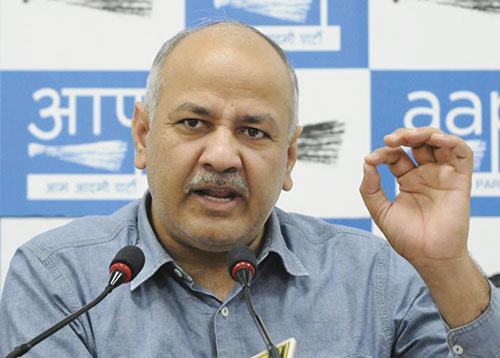
The AAP government is being accused of inciting parents to protest against the allegedly high tuition fees being levied by private schools. What’s your comment?
Why shouldn’t I talk to parents, who are stakeholders in education and have a right to know? For me, education of children is the highest priority, and the medium available to me is letters to communicate with the people of Delhi.
Delhi state’s AAP government has been at loggerheads with the Central government on education-related issues for your entire term in office…
The BJP/NDA government at the Centre has consistently been anti-education and is an enemy of the children of Delhi. On several occasions, the legislative assembly passed Bills amending the Delhi School Education Act, 1973 to bring in transparency, accountability and refund of excess fees levied by private schools, but the Bills were vetoed by the Central government. We also introduced a policy for budget schools, and recruitment of teachers for state government schools, but all our education reform Bills have been vetoed by the Central government.
Private unaided schools accuse the AAP government of targeting them, infringing their autonomy and disallowing legitimate tuition fee increases. What’s your comment?
Let me make it clear that private schools are not outside the purview of law and government policies. There are some law-abiding schools that follow the law but there are others that function as academic shops. The law of this country says education is a charitable activity and doesn’t allow profiteering and commercialisation. Therefore until it is changed we will continue to enforce it. Education is not a saleable product. We will not allow loot of parents in the guise of fee increases simply because some school owners wish to purchase Mercedes cars or start a school chain.
Those who feel they aren’t making enough money should shut down their schools and go to countries where commercial education is permitted. The AAP government is not interfering with the autonomy of private schools as alleged. Autonomy is about learning/teaching with which we haven’t interfered at all. But on issues of transparency and non-compliance with the law, we will interfere.
Although way back in 2015, AAP promised to clean up the private school system especially malpractices related to levy of capitation fees and annual tuition fee increments. This initiative has not been effective…
People tell me that some nursery schools illegally demand capitation fees as high as Rs.15 lakh. According to the Rules framed by us under the DSE Act, we can deregister a school but that would make teachers unemployed and cause great inconvenience to children. Therefore, in 2015 we proposed several amendments to DSE Act for bringing in transparency in the nursery admission process and refund of excess fees. But these amendments have been vetoed by the BJP/NDA government at the Centre. Meanwhile the private school lobby is using the courts to stall our reforms. But this has not dissuaded us. For instance, we have simplified the process for admission of poor children into private primary schools under s.12 (1) (c) of the RTE Act by taking it online.
AAP critics allege that the state government’s school education reforms model is driven by big international NGOs with privatisation agendas.
These charges are baseless and made by people who believe that education reform is an administrative issue. With their clerical mindset, they want government clerks to dictate/interact with teachers and principals because they have no trust in teachers. We don’t share this attitude and have invested heavily in training principals and teachers to manage and run schools.
Delhi’s government schools are still suffering 33 percent teacher vacancies, and have been forced to recruit guest teachers on a massive scale.
I agree this is a failure. But people should know where the blame lies. The Modi government says that teacher recruitment is its domain. Then it should provide us with teachers. That’s where the blame should be laid.
Among the initiatives taken by AAP government is the introduction of happiness and entrepreneurship into the curriculum of government schools. Critics say this is mere window dressing…
These initiatives have been taken to sensitise children and teach them values and responsibilities. By informing them about business and entrepreneurship, we want to lay the foundation for change of mindset — teaching children that job creation is better than employment.
With Dilip Thakore





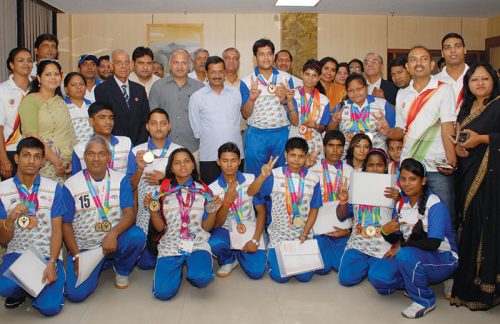








Add comment